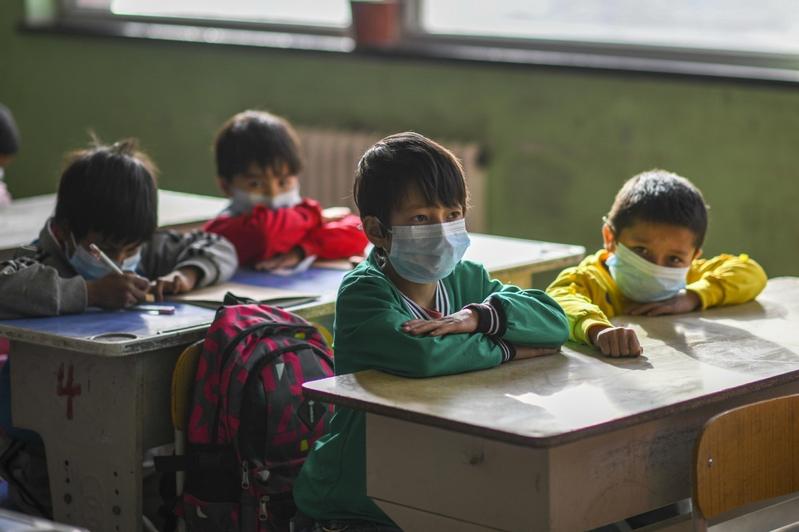 Students listen attentively to the teacher at a primary school in Moyu county, Hotan prefecture of Northwest China's Xinjiang Uygur autonomous region, March 23, 2020. (PHOTO / XINHUA)
Students listen attentively to the teacher at a primary school in Moyu county, Hotan prefecture of Northwest China's Xinjiang Uygur autonomous region, March 23, 2020. (PHOTO / XINHUA)
Beijing's municipal government plans to invest around 1 billion yuan (US$153 million) to help improve education in southern Xinjiang's Hotan prefecture this year. More than 60 projects will be carried out, mainly to upgrade school facilities, train teachers and push forward construction of the prefecture's first university.
During the 13th Five-Year Plan period (2016-20), China's capital invested more than 2 billion yuan to implement over 200 projects to enhance education in the Xinjiang Uygur autonomous region.
The projects helped to build or renovate 193 primary schools, middle schools and kindergartens across an area of more than 2.6 million square kilometers. Beijing has also selected and dispatched more than 640 teachers to support the development of preschool education, nine-year compulsory education, vocational education and higher education in the region.
In October, Zhang Lianyi, formerly a senior teacher at Beijing Pinggu Middle School, was dispatched to be a math teacher at a middle school in Hotan's Lop county.
"The support from my family members strengthened my determination to come to Xinjiang," he said. "The warm, unsophisticated local people in Lop county and my hardworking colleagues here have also inspired me a lot."
Zhang, who has 32 years of teaching experience, decided to spark students' interest in learning math by creating an active, humorous atmosphere in his classroom.
During the 13th Five-Year Plan period (2016-20), China's capital invested more than 2 billion yuan to implement over 200 projects to enhance education in the Xinjiang Uygur autonomous region
ALSO READ: Xinjiang thrives as education, trade, healthcare flourish
He uses his spare time to help students who struggle to keep up with others overcome their weak points.
One of his students, Murat Abdullah, studies hard but usually fails to get good grades in exams. After class, Zhang works with Murat and reviews the lesson taught in class that day, gradually helping him find an efficient method of study.
Teachers are not only dispatched to Xinjiang to teach, but also to promote advanced, scientific approaches and ideas about education and school operations in the region.
Xu Ning, who once worked with the High School Affiliated to Beijing Normal University, is now the vice-president of a middle school in Lop.
Xu, 33, has initiated a pairing assistance program that requires teachers from big cities to offer one-on-one assistance to young local teachers at the school. More than 110 teaching and research activities have been conducted to encourage the exchanges.
He said that through the program, teachers from Beijing and other cities can better integrate with the middle school's faculty and help change local teachers' ideas about teaching students and managing schools.
READ MORE: White paper: Xinjiang education, training in line with rule of law
"That will have a sustainable impact on the development of local education," Xu said.
Beijing has invested more than 200 million yuan to recruit about 20,000 university students to be intern teachers in Hotan since 2018, helping to ease a shortage of Mandarin teachers in the prefecture. This year, the capital will invest 58 million yuan to boost the recruitment.


